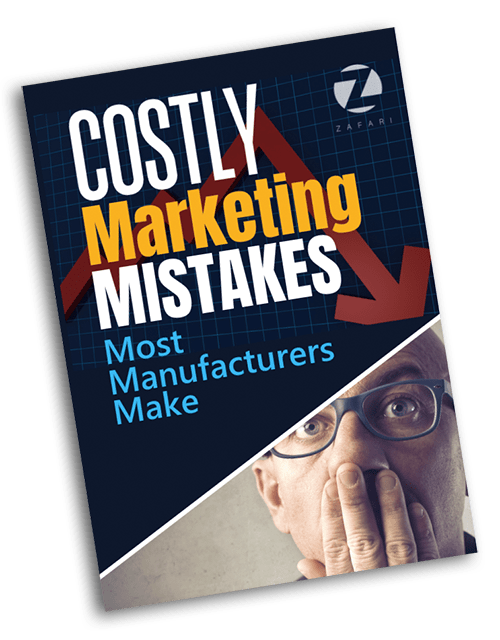Undoubtedly, marketing plays a key role in the success of any business. However, the perception customers have towards marketing can impact its effectiveness. In our experience working with various manufacturers, we have encountered numerous industrial companies that view marketing as using aggressive sales tactics, pushy advertisements, and relentless promotion. This is primarily because of the way businesses approach them. Customers are simply seeking solutions to their problems, yet marketing often feels like a ploy to manipulate them into purchasing unnecessary items. That is surely a costly marketing mistake that hurts your engagement with your audience. Therefore, it is important to change the way you promote your products or services to your target audience. Here we will learn how prioritizing problem-solving over sales pitches can strengthen bonds with customers, improving business connections.
Rethinking Marketing: From Selling to Solving
At its core, marketing is about communication. It’s about conveying a message or idea to a target audience to influence their behavior. Unfortunately, traditional practices often prioritize the sale above all else, leading to tactics that can feel intrusive or deceptive. However, by reframing marketing as a means of helping people solve problems, we can completely shift the paradigm. Instead of focusing solely on pushing products or services, problem-solving marketing is centered around understanding the needs, pain points, and desires of your audience and offering genuine solutions to address them.
The Mantra of Problem-Solving Marketing
So, what does problem-solving marketing look like in practice? Here are a few key principles to keep in mind:
Empathy First, Sales Second:
Empathy lies at the heart of problem-solving marketing. Rather than approaching potential customers with the sole intention of making a sale, take the time to truly understand their challenges and frustrations. What keeps them up at night? What obstacles are they facing? By empathizing with their situation, you can tailor your marketing efforts to offer meaningful solutions that genuinely address their needs. You also need to give them a plan for how to get from their current problem state to their desired goal [find out more here].
Educate and Inform:
One of the most effective ways to build trust and credibility with your audience is through education. Instead of bombarding them with sales pitches, focus on providing valuable information in a way that’s meaningful to THEM. This empowers them to make informed decisions. Whether it’s through blog posts, videos, webinars, elevator pitches, or social media content, strive to become a trusted source of knowledge in your industry.
Focus on Relationships, Not Transactions:
In problem-solving marketing, the goal isn’t just to make a one-time sale; it’s to cultivate long-term relationships with your customers. Take the time to engage with them on a personal level, listen to their feedback, and demonstrate your commitment to their success. By prioritizing relationships over transactions, you can foster loyalty and advocacy that extends far beyond the initial purchase.
Provide Value Every Step of the Way:
Every interaction with your audience is an opportunity to provide value. Whether it’s through personalized recommendations, helpful resources, or exceptional customer service, strive to exceed their expectations at every touchpoint. By consistently delivering value, you not only differentiate yourself from competitors but also create positive associations with your brand that resonate long after the transaction is complete.
An Example of Problem-Solving Marketing in Action
Let’s imagine there is an electric switchgear company supplying their products to commercial facilities. Instead of solely pushing their products, they take a more innovative approach. They kick-start their marketing efforts by producing educational content, including insightful videos and informative guides. These resources focus on empowering businesses to manage their electricity more efficiently, offering tips on energy conservation, enhancing reliability, and preventing disruptions in industrial settings. To foster collaboration and knowledge-sharing, they establish online forums where industry professionals can exchange ideas and troubleshoot common electrical challenges. They also leverage social media platforms and email newsletters to provide quick assistance and valuable insights to their audience. The switchgear company focuses on emphasizing the specific problems they solve, which allows them to showcase their switchgear products in action. Whether it’s highlighting how their systems predict potential breakdowns or discussing their flexibility to adapt to changing business needs, the focus remains on tangible solutions. This approach has helped them establish themselves as an expert among their target audience. Their reputation for providing practical advice and effective solutions earns them the trust of clients, leading to increased sales and long-term partnerships.
In Conclusion
Marketing doesn’t have to be synonymous with selling. By embracing the principles of problem-solving marketing—empathy, education, relationship-building, and value creation—businesses can forge deeper connections with their audience, build trust and loyalty, and ultimately drive sustainable growth. So the next time you think of marketing, remember: it’s not about convincing people to buy something —it’s about helping them solve a problem that’s a clear pain point in their lives. Looking to create a problem-solving marketing campaign to grow your manufacturing business? Our industrial marketers are here to help you. Schedule a FREE strategy call now!






